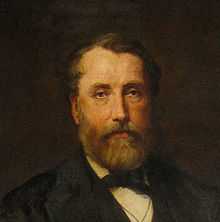Mark Firth

Mark Firth (25 April 1819 – 28 November 1880) was an English industrialist and philanthropist.
Born in Sheffield, Mark joined the crucible steel works of Sanderson Brothers where his father worked as head smelter, but left in 1842 to set up his own business with his brother, Thomas Jr, in 1842. Their father joined them shortly afterwards, and in 1852 the business had expanded into larger premises at the Norfolk Works in Savile Street, which had the largest rolling mill in Sheffield.
The Firth's business expanded into the armaments market, installing two large steam hammers in 1863. In 1871, the company cast the thirty five ton "Woolwich Infant" gun. In 1875 they produced an eighty ton gun.
Mark Firth was elected to the office of Master Cutler in 1867, which he held for the following two years. He was elected Mayor of Sheffield in 1874. In 1875, he presented a thirty six acre estate to the town of Sheffield as Firth Park. He also built a mansion for himself on the outskirts of Sheffield at Oakbrook, Ranmoor, now part of Notre Dame High School. In 1879, he opened Firth College to teach arts and science subjects, which later became part of the University of Sheffield. Firth lends his name to the Firth Wing of the Northern General Hospital, and Firth Court of the University.
He was a Methodist and a Liberal.[1]
He is buried in Sheffield General Cemetery on Cemetery Road, where his monument is Grade II listed.
See also
References
- ↑ Oxford Dictionary of National Biography